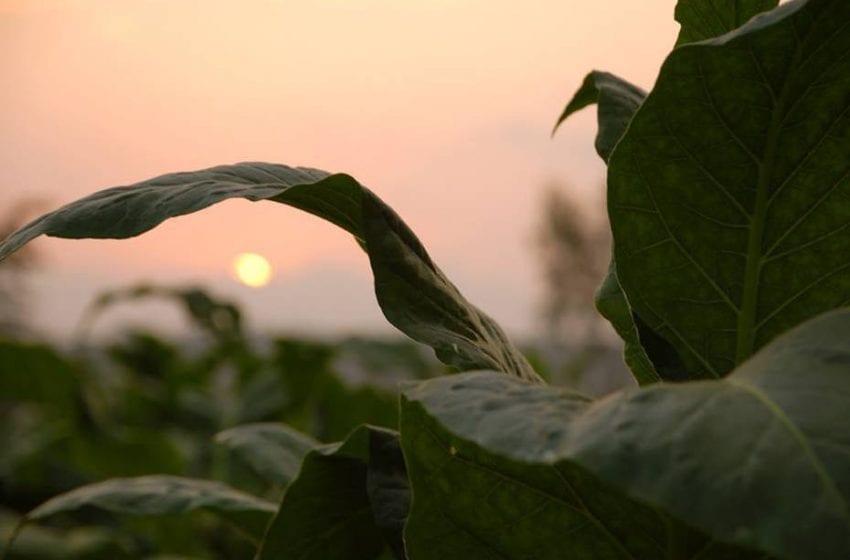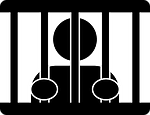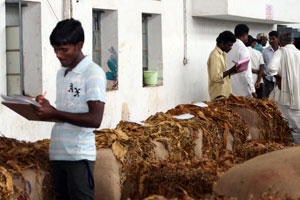Zimbabwe’s flue-cured-tobacco growers always complain about getting a raw deal despite their being the goose that lays the golden egg of much-needed foreign currency, according to a story by Fidelity Mhlanga for the Zimbabwe Standard.
And their concerns have been voiced yet again ahead of the opening of the 2018 tobacco marketing season on March 21.
But whether their voices will be heard is another matter. Mhlanga reported that each marketing season growers were left stranded as the authorities seemed not to address their plight.
The Federation for Farmers’ Union chairman Wonder Chabikwa reportedly said there was a need to handle carefully tobacco farmers’ welfare because they facilitated the inflow of forex into the country.
Mhlanga reported that last season the Reserve Bank of Zimbabwe (RBZ) had announced that growers would be paid [in cash] $1,000 initially, while the rest of their earnings would be deposited in bank accounts.
That never happened, leaving farmers at the mercy of ‘cash barons’ and unscrupulous traders who took advantage of the chaos by buying tobacco in cash at lower prices than those prevailing on the auction floors.
Recently, RBZ governor John Mangudya said that, upon presentation of sales statements, growers would be paid $300 per day through banks stationed at auction floors. He said the balance would be transferred into growers’ bank accounts.
The Zimbabwe Tobacco Association CEO Rodney Ambrose said small-scale farmers should be prioritised as they had not embraced plastic money.
“Therefore, farmers should once again be prioritised in their requirements for cash-based costs and foreign currency allocation for critical inputs and capital expenditure, the latter of which the RBZ has pledged to do this season.”
Economist Clemence Machadu said the rural areas where most tobacco was grown were deprived of banking infrastructure, hence the need for cash.
And Machadu said it was essential for authorities to deal decisively with bogus buyers to bring sanity to the tobacco selling procedure.
Meanwhile, the Tobacco Industry and Marketing Board (TIMB) said it was geared to stem the problem of bogus buyers this season. It had been conducting training and awareness programs for farmers; it had put in place stringent crowd control measures at the selling points and was it working closely with the Zimbabwe Republic Police and the President’s Office.
Category: People

Eating the golden goose

Rangpur plantings down
The amount of land planted to tobacco in the Rangpur district of Bangladesh is this season down by about 13 percent on that of the previous season, according to a story in The Daily Star. And it is down by about 69 percent on that of the 2012-13 season, when a modern record was set.
The Star report said that the fall in plantings had come about as farmers had realized the bad impact that tobacco was having on their health and that of consumers.
The senior agriculture officer at the Rangpur Department of Agriculture Extension (DAE), Sajidur Rahman, was reported to have said that about 1,388 ha of land had been planted to tobacco in Rangpur during the 2017-18 cropping season, down from 1,595 ha in 2016-17.
About 4,500 ha had been planted to tobacco in Rangpur during the 2012-13 season, which was the highest ever in the district in recent years.
But, after that, plantings had started to drop. During the 2013-14 season, 2,522 ha was planted to tobacco, while by 2014-15, plantings had fallen to 2,130 ha.
Warnings not working
Cigarette-pack health warnings do not seem to be having the desired effect in Denmark, according to a story in The Copenhagen Post.
Although smokers are warned that smoking kills and are presented with graphic images depicting the diseases they risk contracting, the incidence of smoking has been increasing.
The post, quoting a report by DH Nyheder, said that new figures from the Danish health authority, Sundhedsstyrelsen, profiling the health of the nation for 2017, indicated an increase in the number of people aged 16-45 who smoked daily.
From 2010 to 2013 the number of daily smokers had been falling, but, during the past four years, there had been an increase, especially in the 16-45 age group.
According to the survey, 16.9 percent of people of all ages said they smoked on a daily basis, up from 15 percent during 2013, and 5.5 percent said they smoked once in a while. That equates to about 1.06 million people.
The highest numbers of smokers are found in the 55 to 64-year-old age bracket.
The Danish cancer organization, Kræftens Bekæmpelse, has said it is ‘extremely concerned’ with the situation.
“We find this very worrying,” said the organization’s project leader, Niels Them Kjær. “We’ve seen signs of it earlier amongst the very young, but now we can see that it is a broader group of young people who are smoking more.
“It will mean more cases of cancer in future,” he added.
Kjær believes laws passed in 2007 restricting smoking have created a false sense of security around the issue.
“We need action on a broad front,” he said. “For example: higher prices, tobacco kept under the counter in shops, and perhaps ‘smoke-free’ schooling in establishments for educating young people. That would make a big difference.”
Illegal tobacco growing
Police have uncovered five ha of illicit tobacco being grown in the Australian state of Victoria, according to a story in the Ballarat Courier.
The tobacco was said to have been found at Dunnstown, which is close-to and east of Ballarat.
Police officers said on Monday that an investigation into the illegal tobacco trade had led to the arrest of two men and the seizure of guns, ammunition and tobacco in Dunnstown.
Ballarat detectives were said to have joined forces with the Australian Taxation Office before executing a number of search warrants on Thursday.
The search was said to have uncovered five ha of tobacco plants, 4.2 tonnes of tobacco leaves, equipment used to process tobacco, and three unregistered guns and ammunition.
A 66-year-old man and 61-year-old man, both from Dunnstown, were arrested at the scene.
They have been assisting police with their inquiries but no charges had been laid as of Monday afternoon.
SEKAP fine suspended
The First Instance Administrative Court of Komotini, Greece, has suspended a €44 million (US$54.2 million) fine imposed on SEKAP SA for alleged customs violations dating from 2008, prior to its acquisition by the Russian-Greek investor Ivan Savvidis, according to a Greek Reporter story relayed by the TMA.
The court accepted the company’s request and suspended the execution of the notice of the Xanthi customs office for the payment of a fine of €38 million (US$46.8 million), which had increased to €44 million with the accumulated penalties for being in arrears since 2009.
Employees of the tobacco company supported the suspension application filed by Savvidis’ lawyer Alexandros Lykourezos, arguing that the company would be forced to go bankrupt if the fine were not overturned.
Time to move on
The Foundation for a Smoke Free World (FSFW) has told tobacco growers in Malawi that there is a need to shift to other crops that could take over as the country’s main foreign exchange earners, according to a story in The Nyasa Times.
The vice president of the FSFW responsible for agriculture and livelihoods, Jim Lutzweiler, was said to have made this remark while speaking on Wednesday on the side-lines of a consultative meeting on alternative crops that was held in Lilongwe.
Lutzweiler said tobacco was becoming less acceptable on the world market, which meant that alternatives ought to be identified before it was too late for economies that were dependent on tobacco.
“In the event that tobacco has completely phased out as a reliable cash crop in Malawi, we would like to mobilize interest of people and many other stakeholders to think of an alternative cash crop with a formal market, to help farmers be able to move on economically,” he said.
Malawi’s farmers, he added, could replace tobacco with soya beans, “provided everyone understands the importance of this idea well ahead of time as tobacco has globally been proved a health risk for people.”
Tobacco is thought to contribute about 50 percent of the country’s foreign exchange earnings.
The FSFW, which was set up last year with initial funding of $1 billion over 12 years from Philip Morris International, is legally independent of PMI. Two of its main aims are to provide funding for research into accelerating the ending of tobacco smoking, and to prepare for the consequences of any success in reducing smoking that will be felt by smallholder tobacco farmers.
Meanwhile, the Ministry of Agriculture, Irrigation and Water Development’s director of extension services, Albert Changaya, said the issue of an alternative crop to tobacco was not new; so it would be necessary to look at what previous advocates had done and to learn from their successes and failures.
And the Parliamentary Agriculture Committee’s deputy chairperson, James Munthali, said diversifying from tobacco had to be done in a realistic way.
He said parliament had enacted the Warehouse Receipt Law which could help in identifying more valuable crops to be sold through structured markets such as the AHL Commodities Exchange and Agriculture Commodities for Africa.
“In my understanding, we are not going to replace tobacco overnight, but we need to gradually replace it,” he said.
“The volumes we used to sell in the past have dropped, which is a wake-up call.”
Speaking at the meeting on behalf of the Tobacco Control Commission, Patricia Kasamale said her organization would keep on watching the efforts being taken. “We support all initiatives being undertaken by FSFW to find crops that will complement tobacco,” Kasamale said.
There was a word of warning, however, from Hugh Saunders, MD of Alliance One, about the conflicting information being sent to farmers about switching from tobacco to other crops, given that no crop had yet been identified as a replacement for tobacco.
“The solution is to have an alternative crop,” he said. “Tobacco is a high value crop and there are factors that need to be taken into consideration when pondering on this issue.”
Tax structure hits TTM
The state-run Thailand Tobacco Monopoly (TTM) is expecting to make the first loss of its 79-year history following the imposition of new excise tax rates that, it claims, have benefited importers of foreign cigarettes, according to a story in The Bangkok Post.
The TTM will make a loss of about 1.5 billion baht this year because it has not been able to reduce its spending in light of the new tax, which was implemented in September, said Daonoi Suttiniphapunt, the company’s MD.
Under the new tax structure, packs of cigarettes with a retail price of more than 60 baht are subject to a 40 percent levy, while cheaper packs attract a rate of 20 percent.
Daonoi said that the suppliers of some foreign brands had lowered their prices to avoid the high tax. This was possible for them because they bore lower production costs than did the TTM.
It was not financially viable for the TTM to reduce its cigarette prices and, as a result, it had lost market share to its competitors.
At present, TTM’s sales accounted for about 55 percent of the market, down from 80 percent before the tax-structure change.
Daonoi said also that the Finance Ministry-owned state enterprise was shouldering huge costs in relation to employment, unmanufactured tobacco and the development of a new factory, due to be ready in 2020.
The TTM employed more than 3,000 staff, compared with only 1,000 employed by foreign cigarette manufacturers, while the TTM was required to buy domestic tobacco at “unusually high prices”, she said.
The state enterprise is said to be paying growers 22 baht per kg – higher than the market price.
But with the drop in cigarette sales, the TTM is expected to buy 40 percent less tobacco this year than it did last year.
Other spending that contributes to the TTM’s financial state includes running a hospital and investment in a public park inside its factory compound.
Daonoi admitted that liquidity was likely to become an issue from May onward, after which the TTM would seek its first-ever loan.
In the meantime, the TTM has called on the Excise Department to revise the new tax structure.
It is also making preparations to allow it to manufacturer non-TTM brands, and to sell TTM brands overseas.
Fair go mate!
The Lower House of the Australian parliament on Wednesday passed and sent to the Senate a bill that would introduce a jail term of up to five years for possessing, buying or selling illicit tobacco products, according to an Aap Newsfeed story relayed by the TMA.
Those who manufacture such products would be liable to a jail term of up to 10 years.
Liberal MP Craig Kelly said that whenever the government increased taxes, making cigarettes more expensive, black market activity increased.
It was necessary to respond to such increased activity, he added, by making the appropriate resources available to law enforcement agencies engaged in tackling the black market.
And it was necessary to ensure that penalties for illegal activities were appropriate.
Meanwhile, the Labor MP Shayne Neumann said that since the Australian Border Force’s tobacco strike team was established in October 2015, it had seized ‘104 MT of smuggled tobacco and 233 million cigarettes’.
Neumann said illicit tobacco trade “undermines the Australian government’s strategies in terms of prevention and control of tobacco products”.
Pouring gas on the fire
Tobacco tax hikes announced in this week’s federal budget will deal a severe financial blow to Canadian convenience-store owners by fueling demand for cheaper illicit cigarettes, according to the Ontario Korean Businessmen’s Association (OKBA), the largest organization of independent convenience stores in the province.
The OKBA said the 2018 federal budget had announced an additional $1 in tax per carton of cigarettes, and an inflation adjustment that added another $1.29 in tax per carton.
The increases announced in this week’s budget had come just before the Ontario government was planning to introduce another $4 per carton tax hike as part of its upcoming provincial budget.
“This federal tax hike, combined with the recent provincial increase will raise a carton price by $6.29,” said Don Cha, general manager of the OKBA. “This will undoubtedly drive more convenience-store owners out of business and drive more smokers into the black market of contraband tobacco.
“Already governments lose more than $1 billion in tobacco taxes when consumers buy their products from the black market. These tax increases will cause them to lose even more money that could be put to good use.”
A study conducted late last year on behalf of the Ontario Convenience Stores Association (OCSA) revealed that nearly 40 percent of all tobacco products consumed in Ontario was illicit. According to the study, illicit cigarettes now account for 37.2 percent of all cigarettes smoked in the province. The study showed also that the level of contraband tobacco in Ontario had been rising at an ‘alarming’ rate during the past three years.
“The budget speech this week said that tobacco taxation is known to be one of the most effective ways to keep tobacco products out of the hands of young people,” said Cha. “But that’s simply not true. The reality is that repeated government tax hikes mean the price gap between legal tobacco and contraband tobacco continues to grow larger and larger, and that makes illegal cigarettes financially more available, especially to lower-income residents and minors.”
Cha said that it was hypocritical of the government to avoid overly expensive pricing for marijuana in order to prevent the growth of illegal sales. In speaking about the sale of licit marijuana recently, the prime minister had pointed out that if prices of licit and contraband marijuana were even, people would choose to buy licit products. The same standard should apply to tobacco as well, Cha added.
Prices ‘reasonably good’
Flue-cured tobacco growers in the Indian state of Karnataka are being paid ‘reasonably good’ prices during the ongoing 2017 selling season, according to a story in the latest issue of the BBM Bommidala Group newsletter.
After 132 days of sales, growers were said to have sold 80.54 million kg against an authorized crop of 99 million kg.
Bright grades were said to have attracted an average price of about Rs162 per kg, while medium grades had earned an average of about Rs148 per kg and low grades an average of about Rs115 per kg.
Overall, the tobacco sold so far had gone for an average of Rs140 per kg, up from Rs134 per kg during the previous auctions.
Meanwhile, flue-cured tobacco auctions in Andhra Pradesh are due to start on March 8.
The Tobacco Board of India authorized a crop size of 136 million kg for the current season, but, according to official estimates, unhelpful weather means that it is likely to come in at about 120 million kg.
Andhra growers, faced with increased costs, are said to be demanding a price of at least Rs140 per kg.










